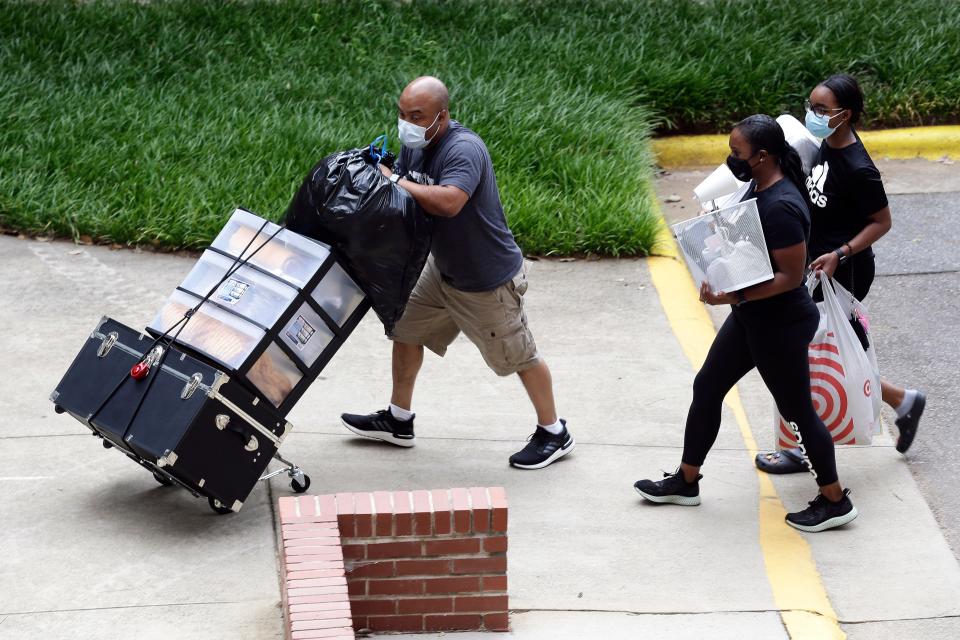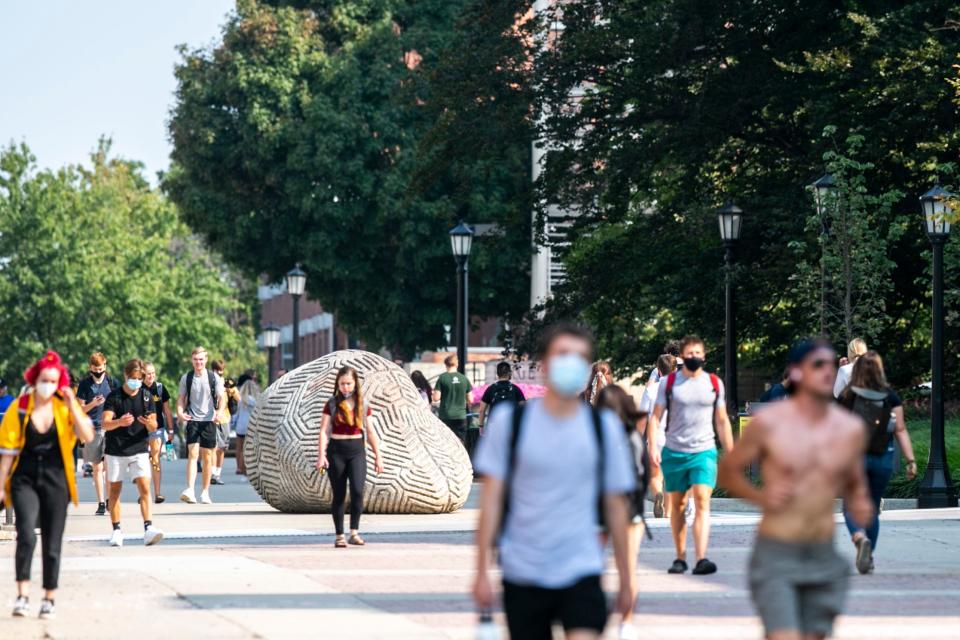An online class by any other name? College students pay rent, enroll – then find courses aren't in-person
Tyrel Henry would rather be at home. Instead, the junior at Lewis-Clark State College in Idaho spends his days mostly alone in his room or working out at a gym.
There isn’t much to do in Lewiston, he said, and he's losing money by being there. If he had stayed home in Kamiah, Idaho, he could live with his grandmother and save money.
It wasn’t supposed to be like this. The college is offering courses in a “hybrid” format, one in which students take both in-person and virtual classes.
Days into his semester, he realized his classes were mostly online. That's a daunting prospect given how his spring semester of digital learning went.
“I wasn’t prepared and motivated enough to learn online,” Henry said. “I struggled, and I was on edge about coming back to school because I didn’t want to struggle again.”
Henry, like many American students, was lured to move back to his college town by the prospect of in-person classes. He has only one class on campus, he said – on Wednesdays. But he is effectively a full-time resident of Lewiston for the semester. For college students such as Henry, the coronavirus-era line between "in-person" and "remote" course offerings is increasingly blurry.
I really moved to Lewiston for online classes.. hate to see it.
— Tyrel (@T_Hen30) August 25, 2020
Across the country, students have crowded into off-campus housing and apartments – some prepared for a semester in person, others living with their friends for another semester online. As campuses reverse their plans for reopening or professors elect to offer individual classes online, the students are still living in town. Many plan to continue the social interactions college officials are trying to end by going online.
At Lewis-Clark State, the college is offering on-campus activities to keep students engaged, along with a mix of in-person, online and hybrid courses, spokesman Logan Fowler said. "Our campus has only seen one confirmed COVID case this fall," he said in a statement. "We’re off to a successful start."
For some students, the chance of having some in-person classes is worth the health and financial risks.
But enthusiasm may dwindle as universities offer watered-down in-person classes, alter their course offerings at the last minute or see spikes in coronavirus within the community.
'Please don't kill him': Fall college classes kick off with COVID-19 warnings, miles of Plexiglas
'In-person' in name only?
Almost all colleges offer some online instruction, even if they publicly say their classes are all in person, said Katie Felten of the Davidson College Crisis Initiative, a group tracking colleges’ responses to coronavirus.
The fine print may be buried on colleges' websites, and some students said they were blindsided by the details after they signed leases or moved on campus.
Families and students should check the course catalogs, most of which are online, to get a better sense of what to expect, Felten said.
But, she said, view that information with skepticism. Some colleges have quickly pivoted their course offerings, and more will follow. Institutions that thought they could open safely are realizing they lacked the resources they need to effectively control the virus’s spread, she said.
COVID-19 tests on campus: Colleges need testing to stay open, scientists say. Some don't have much of a plan
Schools such as the University of North Carolina-Chapel Hill, Notre Dame, North Carolina State University and others opened for in-person instruction – though they had a digital component – only to change to mostly online classes as cases surged on campus and in the community.

Butler University planned an in-person semester but switched to online courses a day before classes started. The university encouraged students to refrain from returning home during the period of remote instruction, saying a “modified ‘shelter-in-place’” would contain virus cases while preventing further spread.
The University of Alabama said Friday it had recorded roughly 1,000 cases since Aug. 19. University President Stuart Bell urged students Monday to follow health guidelines and didn't mention the possibility of switching to remote instruction.
"Everyone who truly values the Alabama experience will continue to follow our health and safety protocols, which provide a path to complete the semester together on campus," Bell's statement read.
'Shame and blame'? Students say college coronavirus outbreaks aren't their fault
Even universities that offered remote learning for the semester, such as Washington State University, have seen outbreaks in their communities. That institution announced it would try to increase testing in the town of Pullman after health authorities reported "increasing numbers of COVID-19 cases involving WSU students living in privately owned, off-campus housing."
Often the effects of reopening in person linger after the switch to digital. After moving to remote instruction Aug. 19 and encouraging students to return home, UNC on Monday reported a nearly 30% positive rate in the roughly 900 COVID-19 tests administered from Aug. 24 to 30.
North Carolina State canceled in-person classes but initially told students they could stay on campus. That changed last week when Chancellor Randy Woodson told students they would have to vacate campus housing.
“The rapid spread and increasing rate of positive cases have made our current situation untenable,” he said.
Many universities, such as Clemson or the University of California-Berkeley, delayed the start of their in-person classes. It's unclear whether they will start face-to-face courses or whether they are just saying what students want to hear, Felten said.
“No one knows how to handle this situation,” she said. “Everything is changing every day.”
'A complete fantasy'? College students move in but make COVID-19 backup plans
Digital classes, in-person prices
For some students, the potential for time away from home is worth the uncertainty. Sadie Varon, 18, moved into her off-campus apartment in Gainesville to attend the University of Florida instead of staying with her family in Tampa.
All her courses will be online, but when she signed up, they were all in-person. Regardless, she said, she is happy to be out of the house. She had lived with her older brother and her parents, and it became chaotic when they all were on Zoom calls at the same time.
Like many students, she said that if classes are all digital, the university ought to offer a discount on tuition. That hasn’t happened at the University of Florida, but a handful of colleges, including Johns Hopkins, Georgetown and Princeton, offer some form of tuition discount.
Then there are the campus fees.
Danielle Cosner, studying for a master's in social work at the University of Iowa, signed up for in-person courses, but that changed the day she was supposed to start. That’s partially welcome, she said. Cases in Iowa City surged, and she doesn’t feel safe studying on campus.

What is unwelcome are the university fees – $61.50 for the student union or $150 for the recreation facility – associated with an in-person experience that she doesn’t have full access to.
Cosner said she tried to appeal the fees, since her coursework is virtual. The university told her she's ineligible for a fee waiver because she lives nearby. The university did not respond to USA TODAY's request for comment.
@uiowa @uiowagpsg @gazettedotcom @presscitizen @LittleVillage @VanessaMiller12 All 6 of my classes were moved online. I am now a distance learning student paying for on campus. UI really won’t refund any fees? What about all the stuff I have to buy to go full time online? pic.twitter.com/NO99lKHipZ
— dani (@daytime_ghost) August 25, 2020
Had she known her classes were going to be online, Cosner said, she would have applied for the digital program, and saved some money while she was at it.
With the cash she would have saved, she could have upgraded her internet, which she described as spotty, or bought a computer that doesn’t crash.
“The response from the (university) feels like, ‘Sorry, sucker. You already signed up for on campus,’” she said.
Education coverage at USA TODAY is made possible in part by a grant from the Bill and Melinda Gates Foundation. The Gates Foundation does not provide editorial input.
This article originally appeared on USA TODAY: COVID-19 college fall 2020: Students surprised to find class is online

